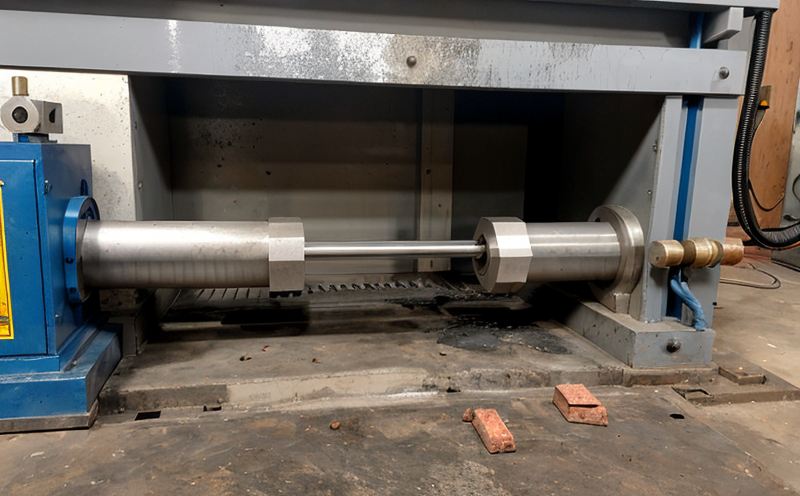ASTM D695 Compressive Properties of Plastics
The ASTM D695 standard is a crucial test method used to determine the compressive properties of plastics. This testing procedure provides valuable insights into how well a plastic material can withstand compression forces without deforming permanently or fracturing. It is widely recognized and utilized in industries where materials are subjected to significant mechanical stresses, such as automotive, aerospace, construction, and consumer goods.
ASTM D695 involves applying a compressive load to a cylindrical specimen until it reaches the point of yielding or fracture. The test setup includes a hydraulic press with a fixed crosshead that applies force perpendicular to the surface of the specimen. The force is incrementally increased, and the displacement of the specimen is monitored using strain gauges. This allows for the calculation of compressive stress and strain.
The testing process begins by selecting an appropriate specimen size based on the material’s intended application. Typically, specimens are cylindrical in shape with diameters ranging from 12 to 50 mm and heights between 25 and 76 mm. The specimen is centered between two flat plates that serve as the upper and lower anvils of the testing machine. A preload is applied before loading to ensure accurate measurements.
The test proceeds by applying a controlled compressive force until either the material yields or fractures. Yielding occurs when there is permanent deformation without fracture, while fracture happens when the specimen breaks. The point at which yielding or fracture occurs is recorded as the maximum load-bearing capacity of the plastic under compression. This value is reported in MPa (megapascals).
ASTM D695 also provides guidelines for reporting test results, including the average compressive strength and modulus of elasticity. The report typically includes details such as specimen dimensions, loading rate, temperature conditions, and any deviations from standard procedures.
The importance of ASTM D695 lies in its ability to predict how a plastic material will perform under compression forces encountered during manufacturing or use. This information is critical for ensuring the durability and safety of products across various industries. For instance, in the automotive industry, accurate compressive strength data helps engineers design components that can withstand impact without deformation.
Understanding the limitations and requirements of ASTM D695 ensures that laboratories conducting these tests adhere to best practices. This includes proper specimen preparation, consistent testing conditions, and adherence to standard protocols for accurate results. Proper interpretation of test results is also essential, as it helps decision-makers select appropriate materials for specific applications.
Compliance with ASTM D695 is important for ensuring product quality and safety. Non-compliance could lead to suboptimal material selection, which may result in premature failure or reduced performance. By adhering to this standard, manufacturers can enhance the reliability of their products while maintaining regulatory compliance.
Why It Matters
The results from ASTM D695 testing are essential for quality assurance and product development processes. They help ensure that materials used in critical applications meet the necessary performance requirements. For example, in aerospace manufacturing, where materials must withstand extreme conditions, accurate compressive strength data is vital to prevent structural failures.
- Quality Control: ASTM D695 tests enable manufacturers to identify and rectify any inconsistencies or defects in the production process. By monitoring compressive properties during quality control checks, companies can ensure that their products consistently meet specifications.
- New Product Development: Engineers rely on compressive strength data from ASTM D695 tests when designing new materials or modifying existing ones. This information helps them optimize material selection for specific applications, balancing factors like cost, weight, and performance.
- Regulatory Compliance: Many industries are subject to strict regulations regarding the safety and performance of their products. ASTM D695 testing ensures that materials used meet these regulatory requirements, thereby reducing the risk of product recalls or legal challenges.
Industry Applications
The ASTM D695 test method finds application in numerous industries where plastic materials are subjected to compression forces. Some key sectors include:
- Aerospace and Defense: Materials used in aircraft components must withstand significant mechanical stresses, making compressive strength a critical property.
- Automotive: Automotive parts often undergo compression during operation, necessitating thorough testing to ensure durability.
- BioMedical Engineering: Medical devices and implants made from plastic materials require robust performance in various environments.
- Consumer Goods: Items like sporting goods and packaging materials need to maintain their structural integrity under compression forces.
International Acceptance and Recognition
- Australia: ASTM D695 is widely accepted in Australian standards for plastics testing.
- New Zealand: Compliance with ASTM D695 is recognized across New Zealand’s manufacturing sectors.
- European Union: The EU recognizes ASTM D695 as a standard for compressive strength tests on plastics.
- United Kingdom: UK regulatory bodies acknowledge the validity of ASTM D695 results in compliance assessments.





